A heritage mansion on the north west fringe of Auckland is not the first place you’d think of as part of the new King Charles III’s estate, inherited from his late mother, Queen Elizabeth II.
But sure enough, the ownership papers for the 732sqm two-storey brick villa on 1.9ha on 25 Clark Road, Hobsonville, show the registered owner to be Her Majesty the Queen.
In reality, the house is not really owned by King Charles III; Crown real estate is owned by the Defence Force which has used the house, known as Clark House, for Royal New Zealand Airforce operations from 1950 until they moved out in 2016.
The fine Italianate-style brick mansion has been boarded up and unused these past six years.
Start your property search
Historical accounts show the Crown paid just £8000 for the property back then. Today the holdings, which have a category 1 listing on the Historic Places Register, have a CV of $16.58 million.
Read more:
- Dunedin’s secret castle for sale: How husband turned lifestyle block into medieval fortress
- From $400K to $1.825m: Sale of Grey Lynn do-up a victory for owners who bided their time
- Interest rate relief: Has the Government opened the floodgates to property investors?
Clark House was completed in 1902 for entrepreneur Rice Owen Clark to showcase innovative new building blocks created by his ceramic business made from the local clay. The Clark family later turned their pottery business into The Amalgamated Brick and Tile Company, best known from the 1940s for its Crown Lynn pottery, and, eventually became the well-known public company, Ceramco.
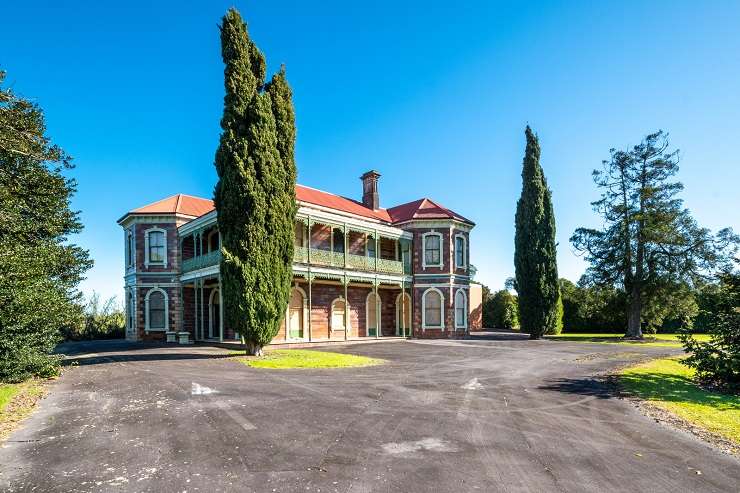
The 1902 mansion on Clark Road, Hobsonville, was built by the Clark family, of Crown Lynn and Ceramco, and has a Heritage 1 protection. Photo / Supplied
When the Hobsonville clay ran out, the company moved to New Lynn, but the Clark family remained in the house until it was sold in 1950.
Until 2016, the RNZAF used the house as offices for Task Force Headquarters, even hosting a South East Asian Treaty Organisation conference in 1955 in the grand rooms.
Phil Gurnsey, general manager estate strategy, for Defence said that most recently Clark House has been a medical unit, the rooms upstairs used as offices, the lower floor for reception and medical testing. An annex was added in 1967 to house a decompression chamber. He added it is currently the only Hobsonville Defence land on the market.
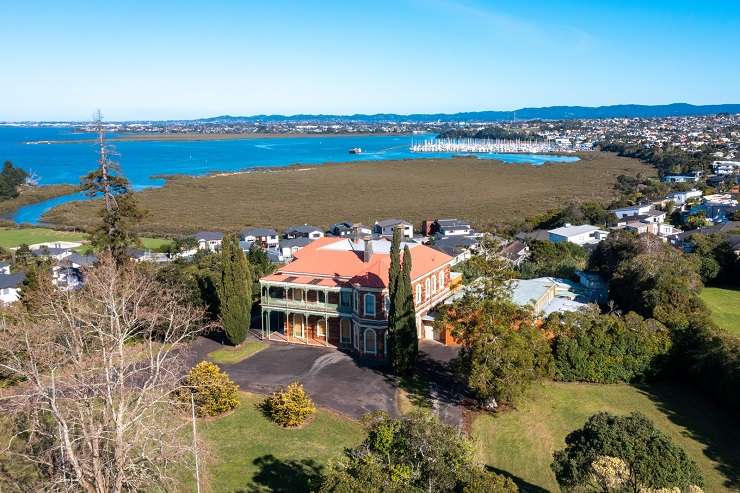
Clark House, Hobsonville, was used by the Defence Department as RANZF offices and medical facilities from 1950 to 2016. Photo / Supplied
The neighbouring RNZAF Base Auckland at Whenuapai has about 1400 personnel and provides the delivery of air operations for the NZDF and other government agencies.
Gurnsey was unable to say what other land was owned by the Crown around the area, including how much was disposed when the master-planned community at Hobsonville Point was developed in the early 2000s, but said his division disposes of properties no longer required for Defence purposes in accordance with standards and guidelines set out by Land Information New Zealand.
Harcourts agent Graham Lewis, who is marketing the property with Sue Noonan for tender closing November 21, said that there may not be another chance to purchase such a property in our lifetime.
“This is a once-in-a-lifetime opportunity for a special buyer to purchase a slice of New Zealand’s history from the current owner, His Majesty the King,” Lewis said.
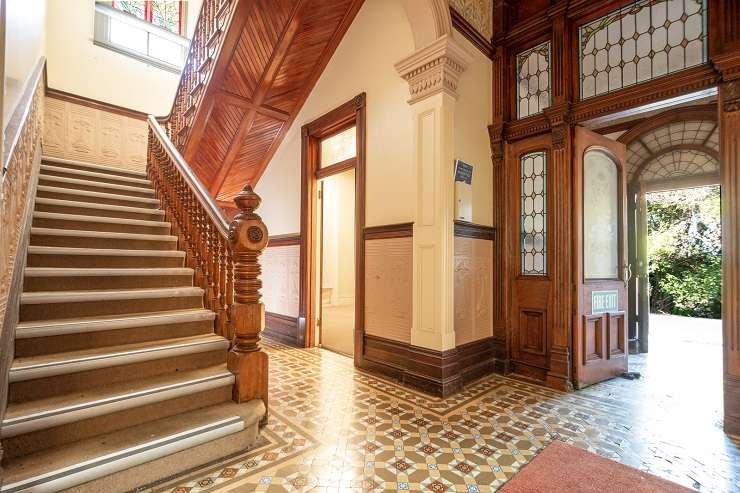
The house was a showcase of craftsmanship, with a grand staircase, Victorian mosaic tiles and stained glass windows. Photo / Supplied
“The building is a fine example of the Italianate villa style. Because of its role as a showpiece, no expense was spared in the building.”
Much of the fine original workmanship has survived, including a grand staircase, kauri ceilings and carved mantlepieces, pressed panel walls, stained glass windows, wrought iron verandah railings and tiled entry floor, although windows are boarded up on the abandoned building and the less than attractive 1960s annex remains.
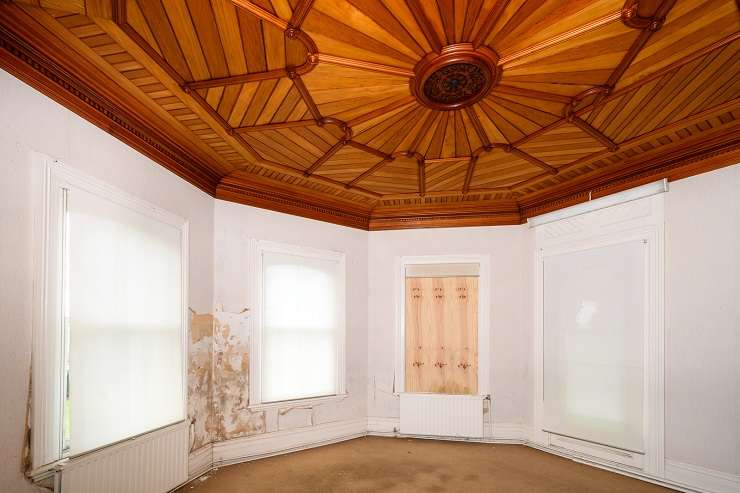
The grand rooms have hosted South East Asian Treaty Organisation meetings, as well as more prosaic offices. Photo / Supplied
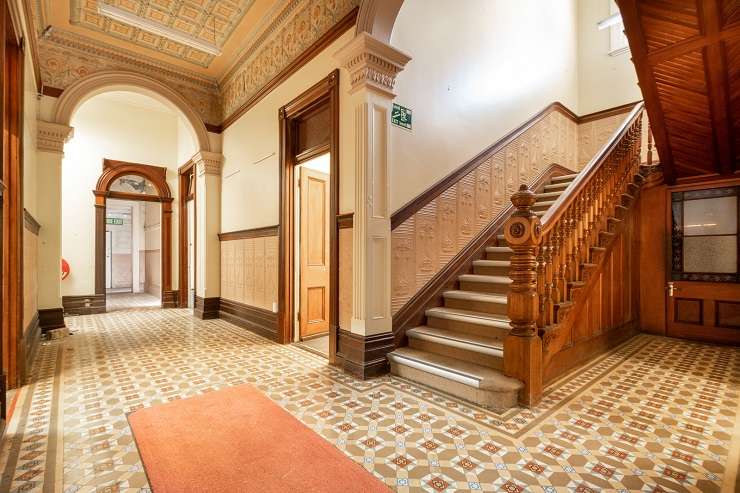
The new owners will be required to meet Heritage New Zealand regulations to preserve the building. Photo / Supplied
Lewis is careful to point out the restrictions and responsibilities that come with such a rare heritage property, leaving it up to buyers to do their own due diligence about how the mansion and its surrounding land might be used. He says potential buyers could consider Clark House for a lodge or fine hotel, an art gallery or even corporate headquarters.
“It takes your breath away the first time you see it. This was a supreme legacy to Rice Owen Clark’s beloved family, status and ambitions.
“I think he’d be pleased that the passion and care of a new owner will bring this home back to its former glory as an historic landmark for generations to come.”
Clarification: An earlier version of this article was headlined "King Charles III puts his Auckland mansion on the market for sale". OneRoof accepts that the headline may have caused confusion. The house is not the personal home of the King and he did not list the property. Clark House is Crown owned and is held under the Public Works Act for Defence Purposes and the title is in the name of the Sovereign for Defence Purposes.















































































